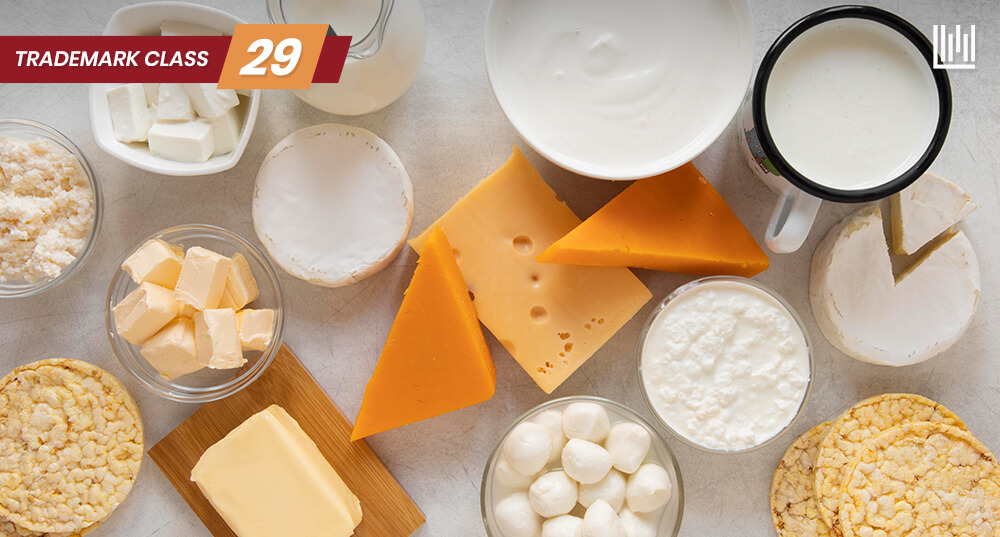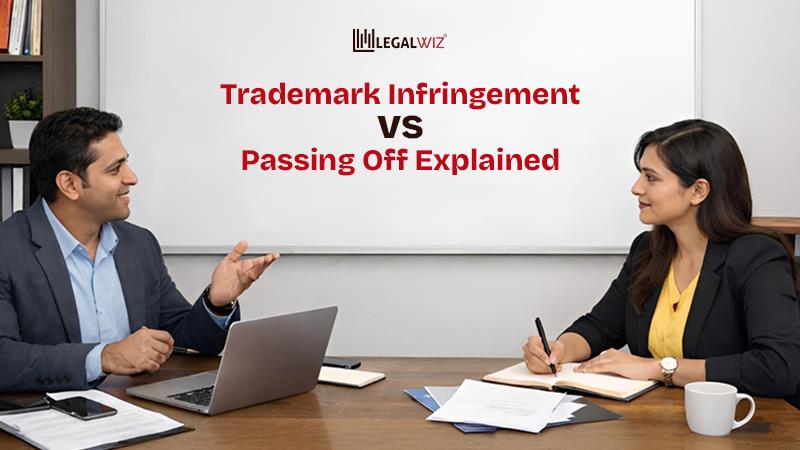Trademark Class 29: Poultry, Meat, Dairy & Oils Guide
If your business deals in edible oils, pickles, dairy products, or packaged foods, your brand must be registered under Trademark Class 29. This class covers a broad range of processed and preserved food items, whether plant-based or animal-derived.
Whether you’re producing ghee, marketing flavored yogurt, or exporting pickled vegetables, securing your brand through trademark registration under Class 29 helps protect your identity in a crowded and highly regulated food industry.
Let’s explore what’s included in Trademark Class 29, what’s excluded, and how to register your brand correctly.
Understanding Trademark Classification in India
Trademarks in India are regulated by the Trade Marks Act, 1999, which allows businesses to protect their brand name, product identity, and visual branding under legally defined classes of goods and services.
India uses the Nice Classification system, an international framework that organizes all goods and services into 45 trademark classes—Classes 1 to 34 for goods and Classes 35 to 45 for services.
What Products Can You Trademark Under Class 29?
Trademark Class 29 includes a broad variety of processed, preserved, and packaged food items made from animal or plant sources. These are typically sold in supermarkets, used in restaurant supply chains, or manufactured for export.
Here’s a detailed list of products you can trademark under Class 29
- Edible oils and fats – Mustard oil, sunflower oil, coconut oil, ghee, vanaspati, and other cooking fats.
- Dairy products – Milk, cream, butter, cheese, yogurt, flavored milk, curd, paneer, and dairy-based desserts.
- Pickles and preserves – Achar, chutneys, jams, fruit preserves, and fermented vegetable preparations.
- Prepared or processed foods – Ready-to-eat meals, canned vegetables or meats, frozen snacks, and heat-and-eat items.
- Meat, fish, and poultry – Cooked or preserved forms such as sausages, meatballs, frozen meat products, and seafood preparations.
- Plant-based alternatives – Vegan meat substitutes, tofu, tempeh, nut-based dairy alternatives, and soy products.
- Snack foods – Roasted nuts, trail mixes, fried chips, and other processed savory foods.
- Eggs and egg-based items – Boiled, powdered, or preserved egg products used in food preparation or packaging.
Explore the Complete List of Products Classified Under Trademark Class 29
If you produce or market processed foods, dairy products, or edible oils, your offerings may fall under Trademark Class 29. This class includes both traditional Indian food items and modern packaged goods across animal-based and plant-based categories.
Use the search function on your device to locate specific items in the complete list and confirm the correct classification before applying for trademark registration.
| Class | Term |
|---|
Looking for the right trademark class for your product? Check out our detailed article on choosing the appropriate class for trademark registration to identify the best fit for your product.
What Is Not Included in Trademark Class 29?
While Trademark Class 29 covers many food products, certain items that appear similar may belong to different classes, depending on their composition, use, or format.
Here are common exclusions from Class 29, along with the correct trademark classifications:
- Unprocessed agricultural products like raw grains, pulses, and unroasted coffee fall under the trademark class for agricultural goods (Class 31), since they are not processed or packaged.
- Non-alcoholic beverages and fruit juices are covered under the trademark class for beverages (Class 32), not Class 29, which focuses on edible solids and fats.
- Spices and food condiments such as turmeric, cumin, or masala mixes fall under the trademark class for staple foods (Class 30), as they are used to season food rather than act as standalone items.
- Dietary supplements and nutritional powders marketed for health or medicinal purposes may be classified under the trademark class for pharmaceuticals (Class 5).
- Food packaging materials such as containers, bottles, and jars are not part of Class 29 and usually fall under trademark class for kitchenware and household items (Class 21)
Determining the exact trademark class for your product can be tricky, especially when items overlap in function. If you’re unsure where your goods fit, use our Trademark Class Search Tool to find the right match and avoid rejection or delays.
Intellectual Properties You Should Trademark Under Class 29
If you’re producing or selling food items within the processed and preserved category, securing your intellectual property under Trademark Class 29 helps protect your brand identity in one of the most competitive and regulated segments of the FMCG market.
Here’s what you should consider trademarking
- Company Name – Your legal business name (e.g., “PureTaste Foods Pvt. Ltd.”) used on product packaging and distribution channels.
- Brand Name – Trademark product-facing names like “Desi Drop Ghee,” “Acharwala,” or “NutriBite” for oils, pickles, or packaged snacks.
- Product Line or Collection Names – Specific offerings like “Spice Pantry Pickle Series” or “DailyFit Dairy Range.”
- Logos and Label Designs – Visual marks, label templates, or emblems printed on jars, bottles, or pouches.
- Slogans or Taglines – Marketing phrases like “Tradition in Every Spoon” or “Naturally Nourishing” used on product packs or ads.
Trademarking these elements helps establish legal ownership and brand consistency across retail, wholesale, e-commerce, and export channels.
List of Popular Brands Registered Under Class 29
Several leading Indian and global food brands have registered under Trademark Class 29 to protect their product lines. Here are a few notable examples
- Amul – India’s most trusted dairy brand offering milk, butter, cheese, paneer, and yogurt-based products.
- Mother Dairy – Known for milk, ghee, curd, and a range of processed dairy and edible oil products.
- Patanjali – Offers a wide variety of Class 29 products including mustard oil, ghee, pickles, and health-focused packaged foods.
- Fortune – A flagship brand under Adani Wilmar, known for edible oils, ghee, and ready-to-cook products.
- Tops – Popular for pickles, fruit jams, preserves, and ketchup, all falling under processed food categories.
- Nestlé – Offers dairy items like milk, cream, and yogurt in addition to its staple food lines.
- Dabur Hommade – Specializes in ready-to-cook and preserved foods like ginger paste, tamarind pulp, and packaged chutneys.
These brands use Trademark Class 29 to secure exclusive rights over their processed food and dairy-based offerings.
Why Register Your Trademark Under Class 29?
In the processed food and dairy industry, your product label and brand name are key to building trust and winning shelf space, both online and offline. Registering your trademark under Class 29 protects your product identity in a highly competitive and compliance-heavy sector.
Key Benefits for Food, Dairy & Edible Oil Brands
- Exclusive Ownership of Your Brand Elements
Safeguard your business name, product labels, logos, and packaging designs from imitation. - Ensure Legal Protection in FMCG, Export & Retail
A registered trademark is vital for selling through supermarkets, distributors, or international trade partners. - Strengthen Consumer Trust & Brand Recall
Trademarks lend credibility to food brands, especially in the dairy and edible oil categories, where trust drives purchase. - Enable Product Line Expansion
Extend your trademark rights to new flavors, regional variations, or product categories under a single brand umbrella. - Avoid Infringement Disputes & Rebranding Costs
Early registration reduces legal risks and helps avoid costly brand changes later.
If you’ve read this far, you likely know if your product falls under Class 29. If it does, now’s the perfect time to take the next step—apply for trademark registration today with expert guidance from LegalWiz.
Still evaluating your next steps? These resources will help you make an informed decision:
- When and why you should trademark a name
- What can be registered as a trademark
- Different types of trademarks in India
- Trademark registration fees and costs in India
- Documents Required for Trademark Registration in India
10,000+ Brands Trust LegalWiz.in for Trademark Protection
From regional pickle manufacturers and dairy cooperatives to cold-pressed oil startups and ready-to-eat food brands, LegalWiz.in has helped thousands of businesses protect their brand under Trademark Class 29.
With expertise in trademark registration, we guide you through the correct classification, complete documentation, and smooth registration, all fully online. Whether you’re supplying to local retailers or exporting globally, we ensure your food brand is protected every step of the way.
Why Choose LegalWiz.in for Your Trademark Registration under Class 29?
Whether you’re producing dairy products, processed meats, or packaged foods, LegalWiz.in makes trademark registration under Class 29 simple and reliable.
Here’s why food and beverage brands trust us
- Accurate Class Filing — Ensure your products, like meat, fish, dairy, and processed foods, are registered correctly under trademark class 29 to secure proper legal protection.
- Fully Online Process — Complete your trademark filing conveniently online, without paperwork or in-person visits.
- Affordable & Transparent Pricing — Clear, budget-friendly plans tailored for startups, manufacturers, and food producers.
- End-to-End Legal Support — From trademark search to filing, objection handling, and renewals, we support you every step of the way.
- Trusted Nationwide — Serving food and beverage businesses across India with expert guidance and proven results.
Frequently Asked Questions
Are fresh fruits and vegetables covered in Class 29?
No. Fresh fruits and vegetables are generally classified under Class 31, which covers agricultural and horticultural products.
Can I register a trademark for dairy products under Class 29?
Yes. Dairy products like milk, cheese, butter, and yogurt fall under trademark class 29.
Are cooking oils included in Class 29?
Yes. Edible oils and fats are covered under Class 29.
Can I register processed foods and canned goods in Class 29?
Yes. Processed, preserved, and canned foods fit within Class 29.
How can I be sure I’m filing in the right class?
Use our Trademark Class Search Tool to verify the correct classification before submitting your application.
Can I register a trademark before launching my food product?
Yes, you can file based on intended use. You’ll need to show your bona fide intent to use the mark commercially.
Is trademark protection valid across all classes?
No. Protection is limited to the class(es) you file in. If your products span multiple categories, register in all relevant classes.
What if I choose the wrong trademark class?
If you choose the wrong trademark class, your application may still get processed, but your trademark won’t be legally protected for the relevant goods or services. This means others could legally use a similar mark in that correct class, and you wouldn’t have grounds to stop them. Moreover, trademark fees are non-refundable, so you’d have to file a new application in the correct class and pay the fees again.
How long does trademark registration take for Class 29?
Trademark registration in India typically takes 6 months to 2 years, depending on any objections or third-party opposition. For a detailed overview of the process, read our complete guide on trademark registration process in India.
How long is a registered trademark valid and when should I renew?
In India, a registered trademark is valid for 10 years. You must renew it every 10 years—either within 6 months before or after expiry—to maintain your rights.

Amisha Shah
Amisha Shah heads content at LegalWiz.in, where she transforms complex legal concepts into clear, actionable insights. With extensive experience in legal, fintech, and business services, she helps startups and enterprises navigate regulatory challenges through engaging, accurate content that empowers informed business decisions.







